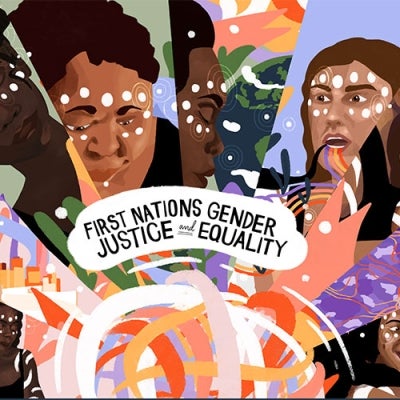Refine results
-
14 December 2012Book page
Human Rights and Equal Opportunity Commission: Social Justice Report 2000
The defining feature of the past year has been the focus on reconciliation ... But as we reach this crucial stage in relations between Indigenous and non-Indigenous Australians, reconciliation has come to mean different things to different people. Reconciliation has been described as a 'peoples movement' ...having reached a level of community support that is now unstoppable. For the government it… -
Aboriginal and Torres Strait Islander Social Justice15 February 2022Publication

Wiyi Yani U Thangani (Women’s Voices) - Implementation Framework (2022)
Commissioner’s Introduction to the Implementation Framework In December 2017, I launched the multiyear Wiyi Yani U Thangani (Women’s Voices) project. The occasion was marked, and the project officially given life, through the dance of a group of First Nations girls and young women from Redfern. The young dancers reignited our powerful matriarchal lineage within their movements, across their … -
Aboriginal and Torres Strait Islander Social Justice14 December 2012Book page
Social Justice Report 2000: Chapter 2: Reconciliation and human rights
Social Justice Report 2000 back to contents Chapter 2: Reconciliation and human rights TABLE OF CONTENTS Introduction Reconciliation - the challenge ahead The role of the past in the reconciliation process Indigenous disadvantage as historically derived False assumptions abou the relationship between Indigenous and non-Indigenous Australians The legitimacy of institutions in Australian… -
14 December 2012Book page
Social Justice Report 2000: Appendix 1 Information concerning Australia provided by the Human Rights and Equal Opportunity Commission to United Nations Committees in 2000
Social Justice Report 2000 back to contents Appendix 1 Information concerning Australia provided by the Human Rights and Equal Opportunity Commission to United Nations Committees in 2000. The following is an extract of the information provided to these committees: 1) Committee on the Elimination of All Forms of Racial Discrimination (CERD): additional information to Australia's 10th, 11th… -
14 December 2012Book page
Native Title Report 2000: Chapter 1: Nation in dialogue
Chapter 1: Nation in dialogue The application of human rights principles to native title has been the subject of an ongoing dialogue taking place both nationally and internationally in the reporting period. This dialogue has occurred between the Australian government and and two UN treaty committees, on the Elimination of Racial Discrimination (August 1999 and March 2000) and the Human… -
Aboriginal and Torres Strait Islander Social Justice11 December 2019Speech
2019 ANZSOC Conference, Justice reimagined: The intersection between Academia, Government, Industry and the Community
Title: Our women have spoken: the need for strengths-based approaches to violence prevention in Aboriginal and Torres Strait Islander communities Yaningi warangira ngindaji yuwa muwayi ingirranggu, Noongar yani U. Well thank you and good morning what a gathering. Thank you to the conference organisers and the working group and for inviting me to open with this keynote address. The issues you… -
Commission - General15 March 2024Speech
Australian Human Rights Commission’s complaint handling jurisdiction
Civil Justice Research Conference 2019 Macquarie University, Sydney Emeritus Professor Rosalind Croucher AM [ Professor Croucher spoke to this paper] Abstract The complaint handling role of the Australian Human Rights Commission from time to time attracts some attention in the media—but not always for constructive reasons. This presentation set out the real story. It is one that is a worthy… -
Legal14 December 2012Webpage
Submission: Sex Discrimination Amendment Bill (No 1) 2000 (Cth)
1.1 The amendments effected by the Sex Discrimination Amendment Bill (No 1) 2000 (Cth) ("the Amendment Bill") go to the core of the guarantee of non discrimination contained in the Sex Discrimination Act 1984 (Cth) ("the SDA"). 1.2 The provisions of the Amendment Bill are of great concern to the Human Rights and Equal Opportunity Commission ("the Commission") and the… -
14 December 2012Book page
Report on the Human Rights Commissioner's Visit to Curtin IRPC in July 2000
Report on the Human Rights Commissioner's Visit to Curtin IRPC in July 2000 On Saturday 29 July 2000 the then Human Rights Commissioner, Mr Chris Sidoti, assisted by a consultant, Dr Mary Crock, Senior Lecturer in Law at Sydney University, visited the Curtin Immigration Reception and Processing Centre outside Derby in the Kimberley region of WA. They made observations and obtained… -
14 December 2012Book page
Social Justice Report 2000: Chapter 3: International scrutiny of Australia's Indigenous Affairs policies
Social Justice Report 2000 back to contents Chapter 3: International scrutiny of Australia's Indigenous Affairs policies Introduction The CERD and the periodic reporting process Australia's appearance before the Committee on the Elmination of Racial Discriminaiton in March 2000 The dialogue between Australia and CERD - March 2000 The meaning of non-discrimination and equality under the…
Pagination
- First page « First
- Previous page ‹ Previous
- 1
- 2
- 3
- 4
- Current page 5
- 6
- 7
- 8
- 9
- …
- Next page Next ›
- Last page Last »
